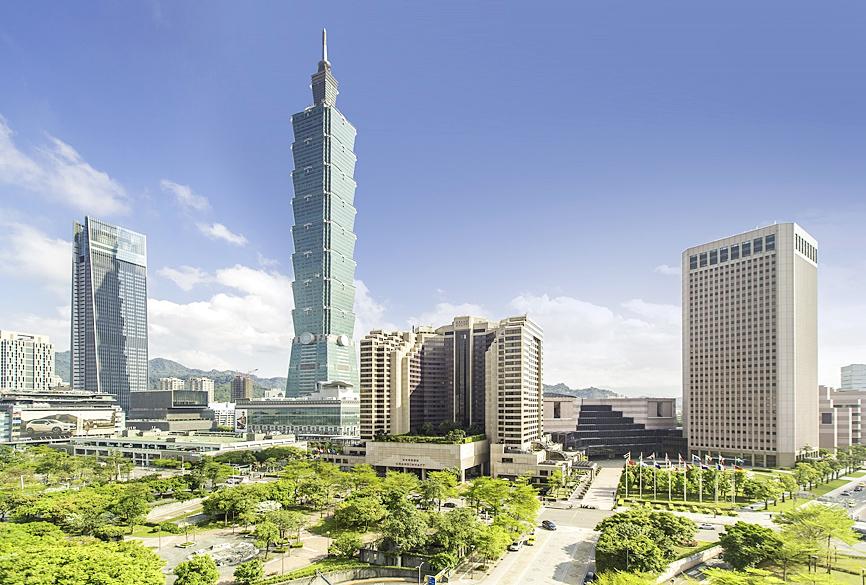Singapore-based Hong Leong Hotel Development Ltd (豐隆大飯店股份) yesterday said it has extended a management contract to ensure the continued presence of the Grand Hyatt brand in Taipei, ending rumors that the two sides were parting ways.
“We are pleased Hyatt is able to come to terms on the extension of the management contract of Grand Hyatt Taipei,” said Kwek Leng Beng (郭令明), executive chairman of City Developments Ltd (城市發展) and Millennium & Copthorne Hotels Ltd (千禧國敦酒店).
Hong Leong Hotel Development is a subsidiary of Millennium, and both fall under the Hong Leong Group (豐隆集團).

Photo courtesy of Grand Hyatt Taipei
The Grand Hyatt Taipei (台北君悅大飯店), owned and built by Hong Leong Hotel Development and affiliates, earlier sought to end cooperation with US hotel chain Hyatt Hotels Corp, which in 2018 inked a pact with private equity fund Riant Capital Ltd (子樂投資) to launch two sister brands nearby — Park Hyatt and Andaz, local media reported.
Hong Leong was reportedly worried that there would be excessive competition among similar brands.
Riant Capital now favors developing office spaces rather than hotel rooms for its upcoming Taipei Sky Tower (台北天空塔) project, which is where CTBC Financial Holding Co’s (中信金控) headquarters used to be, local media said.
Rent rates for office space have increased significantly in Taipei’s prime Xinyi District (信義), as there is no new supply, while there is solid leasing demand from international technology and financial companies, property analysts have said.
Grand Hyatt Taipei, which turns 30 next month, was the nation’s first international hotel brand and remains the largest by number of rooms at 850.
Hong Leong has committed to the local government and community by investing in the hotel’s staff and its physical assets, as evidenced by its renovation of facilities, Kwek said.
“Grand Hyatt Taipei has become an icon and we are confident it will continue to shine and serve local and international guests well,” he said.
Situated near Taipei 101, the hotel has witnessed the growth and prosperity of Xinyi as it has evolved into a central business district in Taiwan and the region, he added.
David Udell, Hyatt’s group president for the Asia-Pacific, said that the Grand Hyatt brand aims to offer captivating and theatrical experiences for all guests.
“We are grateful for our partnership with Hong Leong and look forward to continuing to bring the Grand Hyatt experience to local and international guests for many more years to come,” Udell said.
The hotel would continue to be a preferred venue for hosting large-scale events and weddings, Udell said, adding that the facility is also famed for its award-winning dining outlets.

In Italy’s storied gold-making hubs, jewelers are reworking their designs to trim gold content as they race to blunt the effect of record prices and appeal to shoppers watching their budgets. Gold prices hit a record high on Thursday, surging near US$5,600 an ounce, more than double a year ago as geopolitical concerns and jitters over trade pushed investors toward the safe-haven asset. The rally is putting undue pressure on small artisans as they face mounting demands from customers, including international brands, to produce cheaper items, from signature pieces to wedding rings, according to interviews with four independent jewelers in Italy’s main

Japanese Prime Minister Sanae Takaichi has talked up the benefits of a weaker yen in a campaign speech, adopting a tone at odds with her finance ministry, which has refused to rule out any options to counter excessive foreign exchange volatility. Takaichi later softened her stance, saying she did not have a preference for the yen’s direction. “People say the weak yen is bad right now, but for export industries, it’s a major opportunity,” Takaichi said on Saturday at a rally for Liberal Democratic Party candidate Daishiro Yamagiwa in Kanagawa Prefecture ahead of a snap election on Sunday. “Whether it’s selling food or

CONCERNS: Tech companies investing in AI businesses that purchase their products have raised questions among investors that they are artificially propping up demand Nvidia Corp chief executive officer Jensen Huang (黃仁勳) on Saturday said that the company would be participating in OpenAI’s latest funding round, describing it as potentially “the largest investment we’ve ever made.” “We will invest a great deal of money,” Huang told reporters while visiting Taipei. “I believe in OpenAI. The work that they do is incredible. They’re one of the most consequential companies of our time.” Huang did not say exactly how much Nvidia might contribute, but described the investment as “huge.” “Let Sam announce how much he’s going to raise — it’s for him to decide,” Huang said, referring to OpenAI

The global server market is expected to grow 12.8 percent annually this year, with artificial intelligence (AI) servers projected to account for 16.5 percent, driven by continued investment in AI infrastructure by major cloud service providers (CSPs), market researcher TrendForce Corp (集邦科技) said yesterday. Global AI server shipments this year are expected to increase 28 percent year-on-year to more than 2.7 million units, driven by sustained demand from CSPs and government sovereign cloud projects, TrendForce analyst Frank Kung (龔明德) told the Taipei Times. Demand for GPU-based AI servers, including Nvidia Corp’s GB and Vera Rubin rack systems, is expected to remain high,